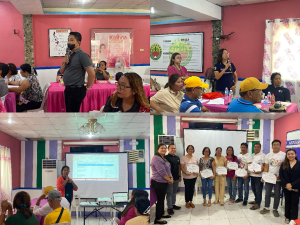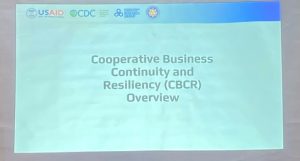
In an era marked by climate uncertainties, economic disruptions, and global shocks, strengthening the resilience of cooperatives is no longer optional—it is essential. In response to this need, the Cooperative Development Authority (CDA) MIMAROPA conducted a comprehensive Cooperative Business Continuity and Resilience (CBCR) Assessment Training from May 27 to 29, 2025, in San Jose, Occidental Mindoro.
The three-day training brought together ten (10) cooperatives from across the province, all eager to equip themselves with tools to prepare for and recover from unforeseen disruptions. The sessions were led by two expert speakers from the Cooperative Research, Information, and Training Section (CRITS) of CDA: Ms. Eva Loraine R. Cataje, Senior Cooperative Development Specialist, and Ms. Fatima A. Casaul, Cooperative Development Specialist II.
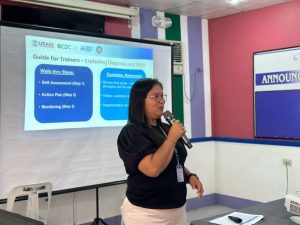
“Resilience is not just about bouncing back—it’s about bouncing forward,” said Ms. Eva Loraine R. Cataje during the opening session. “Through CBCR, we want cooperatives to see risks not as threats, but as opportunities to grow stronger and more responsive to their members’ needs.”
The training was thoughtfully structured into three progressive steps, with one focus per day:
🔹 Day 1 – Self-Assessment
Participants conducted a candid and in-depth evaluation of their cooperative’s internal capacity. Using the CBCR self-assessment tool, they rated themselves across ten resilience categories such as governance, member engagement, communication, financial capacity, and supply chain vulnerabilities.
Interactive small-group exercises allowed participants to reflect on real-world cooperative challenges. They realized how internal weaknesses—when left unchecked—can magnify external shocks.
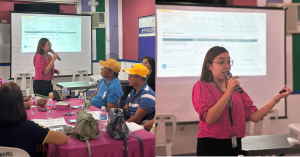
“The first step is always self-awareness. We can’t build resilience unless we understand where we stand,” Ms. Fatima Casaul emphasized. “Today, you’ve started the most important conversation you can have as a cooperative: Are we ready for disruption? And if not, how do we get ready?”
🔹 Day 2 – Action Planning
After identifying priority areas, cooperatives developed realistic and targeted action plans. The second day emphasized setting goals, timelines, responsibilities, and resources needed for each cooperative to implement improvements. Exercises were based on actual cooperative case scenarios, such as disasters, operational risks, and member crises.
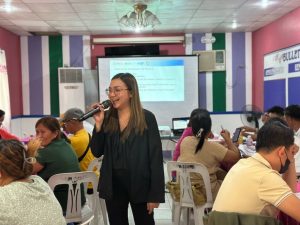
“Your action plans should not gather dust in your filing cabinets,” Ms. Casaul reminded participants. “They must be living documents, evolving with your cooperative and guiding you in times of both crisis and calm.”
🔹 Day 3 – Monitoring Progress
The final day focused on sustainability. Participants learned how to monitor progress, document improvements, and make CBCR an integral part of cooperative management. The emphasis was on cultivating a mindset of continuous improvement and involving both officers and members in resilience-building efforts.
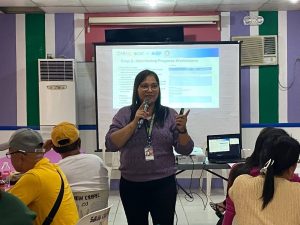
“Monitoring isn’t about compliance—it’s about commitment,” Ms. Cataje explained. “When we track our progress, we honor the effort we put into planning. We stay true to our promise to protect the cooperative and serve our members no matter what challenges come our way.”
Throughout the training, participants shared their own stories of past crises—typhoons, market shifts, and operational setbacks—and how they overcame them. The CBCR training created not only a learning space but a community of practice, where cooperatives drew strength from each other’s experiences.
By the end of the training, participants expressed deep appreciation for the practical tools and empowering approach of the CBCR framework. With renewed determination, these ten cooperatives are now poised to become stronger, more prepared, and more resilient pillars of development in Occidental Mindoro.
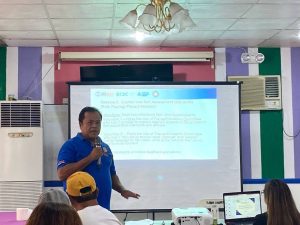
“This training gave us a new perspective,” said one cooperative participant. “We used to react only when something went wrong. Now, we’re planning ahead—and that’s powerful.”
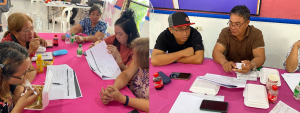
With CDA’s continued guidance and the commitment of local cooperatives, the future of community-based resilience in Mindoro looks brighter than ever.
